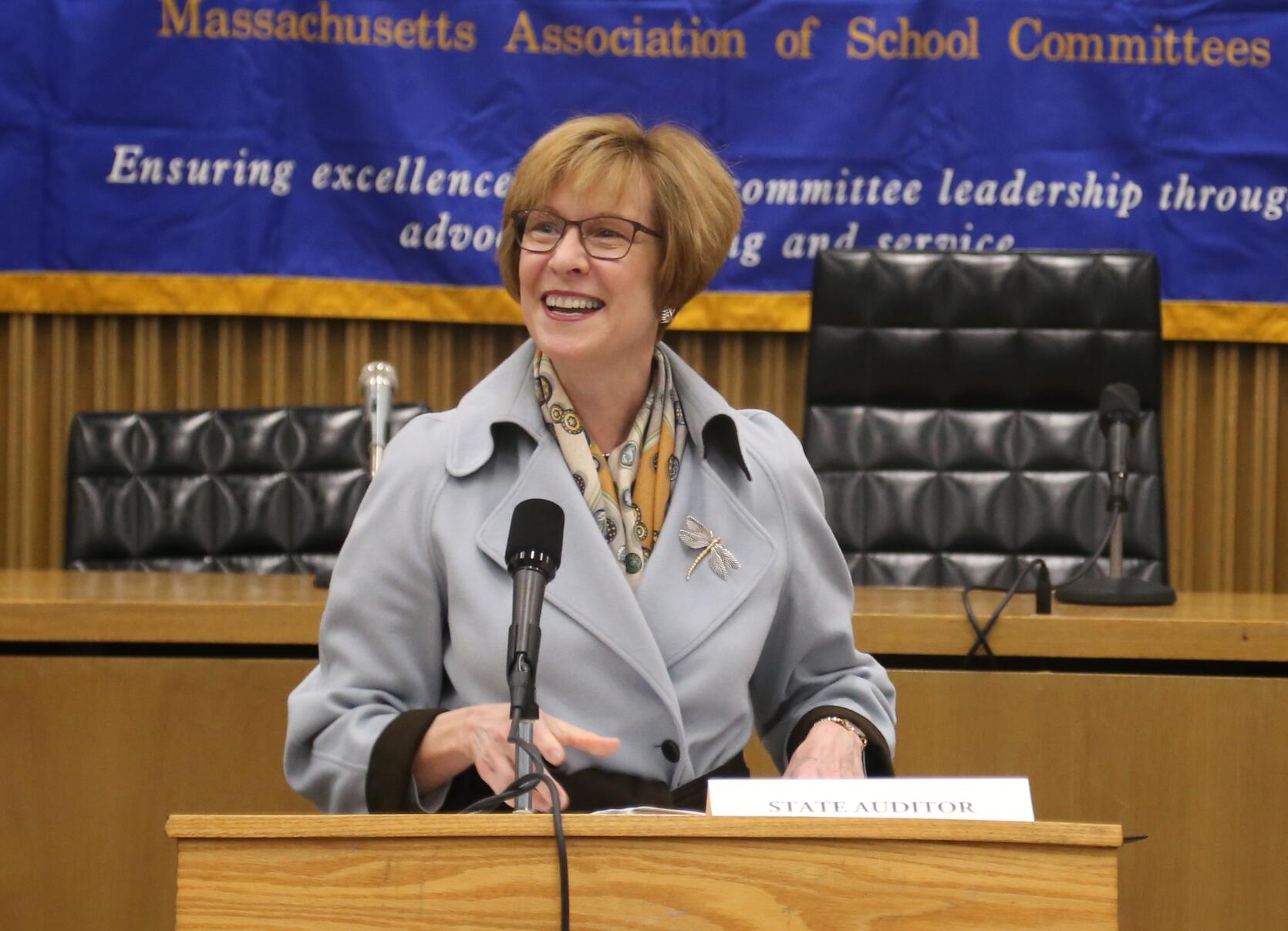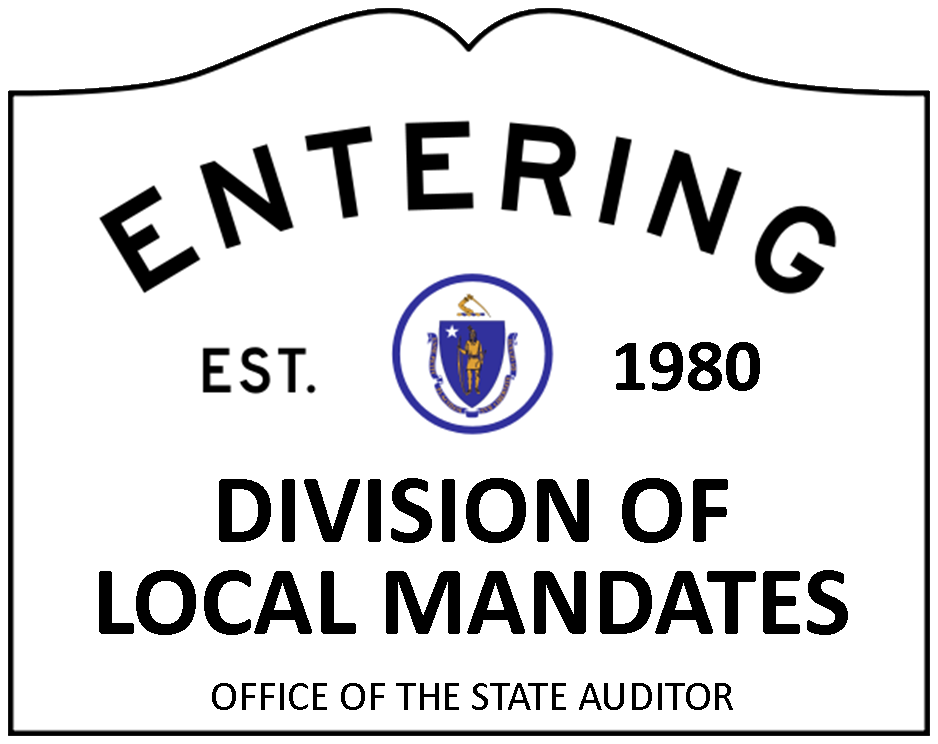- Office of State Auditor Suzanne M. Bump
- Division of Local Mandates
Media Contact
Mike Wessler, Communications Director

Boston — Good morning, and thank you to Jacob for that introduction. It’s a pleasure to be here with you today, and welcome you all to the State House. I want to recognize Glen and Tom, and the staff and boards of the Massachusetts Association of School Committees and Superintendents for helping to organize this day.
I also want to thank each and every one of you for your public service and the work you do to prepare the young men and women who will one day be our leaders. You set the goals and priorities for your school districts and ensure that they have the resources necessary to fulfill Horace Mann’s vision of free public education.
And, through your advocacy, you set an example of the importance of showing up, standing up, and speaking up on the issues that matter. Your voice in this building makes a difference in helping students and teachers to reach their full potential.
When most people think of the State Auditor’s Office, they think of individuals who examine how well an agency is following the law or meeting its mission. This is an important and significant part of the work of my office—but it is not all the Mass. State Auditor’s office does.
Another critical function of my office, as many of you know, is performed by the Division of Local Mandates. The work of DLM is another way in which the Auditor’s office promotes government accountability. This Division is an important tool that protects cities and towns from new unfunded mandates. DLM staff are your go-to resource in government for expertise and official opinions on what does and does not constitute an unfunded mandate. We also conduct municipal impact studies. We now have one underway relative to the costs of upgrading local water infrastructure.
Additionally, DLM is statutorily required to produce, every five years, a report identifying all laws passed by the legislature that have a significant fiscal impact on local governments. If you don’t recall earlier 5-year reports, it isn’t because your memory is failing. It is because never, in the 35 year history of DLM, has such a report been issued. And, I am not too shy to point out that this report coincides with the completion of my fifth year serving in this position.
So, let me tell you about what this report covers. This is not just a listing of all new laws that meet the legal definition of and unfunded mandate. As you know all too well, not every new obligation imposed on municipalities meets the restrictive definition of “unfunded mandate” under the law. Every year there are many new requirements enacted by the Legislative that add to your administrative and even your program costs. Teaching training, anti-bullying protections, school nurse requirements, IEP’s, are but a few examples of new mandates that aren’t considered unfunded mandates, even though they mandate that school district fulfill a new requirement but don’t compensate you for it.
This report goes beyond looking just at “unfunded mandates.” We reviewed over 1,500 statutes that were passed from 2011 to 2015, and identified 97 statutory provisions that have a significant fiscal impact on local governments.
The most heavily legislated areas of municipal impact were employment benefits, public safety, elections, and notably - but not unsurprisingly to this audience—education.
In addition to the few I mentioned a moment ago, there are school district requirements to accommodate military children; to conduct criminal background checks and perform fingerprinting; and to expand college and career readiness programs.
I want to be clear that I’m not questioning the validity of these and other laws identified by our report. Surely we can all agree that supporting military children, protecting the safety of all students, and ensuring students graduate with critical skills are valuable programs.
However, if we all—including the lawmakers—agree that these are areas we value, the legislature should also ensure that you all have the resources to effectively implement these programs. It is a disservice to your students to only partially implement these programs, or pull funding from other worthy educational efforts to meet these new legal requirements.
I’m pleased to say that lawmakers have taken note of this report and its findings. We’ve received tremendous feedback from lawmakers that are sympathetic to this issue and are resolved to achieving a solution. Two weeks ago, I was with Senate President Stanley Rosenberg, who commended the report. He said that for years, he had heard that the legislature was passing costs off to local governments. He praised this report for finally providing a clear assessment to the legislature of these laws; a list they can use as a tool to address these concerns.
I believe that as State Auditor, though, in addition to identifying problems, we must also provide responsible solutions. That’s why, with each audit we conduct, we provide recommendations as well. That state agencies report that they have implemented or are implementing 95 percent of our recommendations is a clear testament to the value of our work.
We carried that same philosophy into this work as well, and along with this report, we provided legislative recommendations to mitigate the adverse fiscal impacts that some proposed legislation and regulations would have on local governments.
The first recommendation would expand the current requirement that state agencies that are adopting, amending, or repealing regulations to share their municipal impact determinations more broadly across state government and improve public access to the information. The goal is to open the regulatory amendment process to a more robust discussion of the changes that affect municipalities. DLM, for instance, is not on the list for sharing. Knowing of these potential regulatory changes would enable us to be an even more effective advocate for municipalities.
The second recommendation would enable DLM to be more pro-active, but authorizing it to review proposed legislation for its potential municipal fiscal impact. So,DLM will determine whether there will be a fiscal impact rather than just issue an ex post facto determination.
The next legislative cycle doesn’t begin until 2017, but I am not waiting for the next session to try to get action on these proposals. Rep. Ted Speliotis introduced budget amendments in the House to implement these recommendation as part of that bill, unfortunately, we learned this morning that those amendments were not moving forward. However, Sen. Katie O’Connor Ives, has indicated her intention to follow suit in the Senate. If you speak with these lawmakers, please express your gratitude for recognizing the problems identified by our report, and showing the leadership to move on the solutions. And let your legislators know of your support for them.
Ultimately, your voice is far more powerful than mine. All of you in this room are the ones who have felt the impacts of these often unintended, but financially impactful components of legislation. You’ve had to adapt to these laws, while continuing to make ends meet on your budget to ensure students get the education they deserve. I hope you’ll share your experiences, and relay the importance of these measures.
Thank you once again for being here today, and for being advocates for students, teachers, and administrators from across the state. The work you do in this building today, along with the work you do every day in your communities, will go a long way toward building a brighter future for the Bay State. You are developing the leaders of tomorrow, and for that, you will always have my gratitude.
